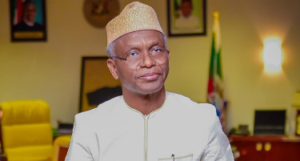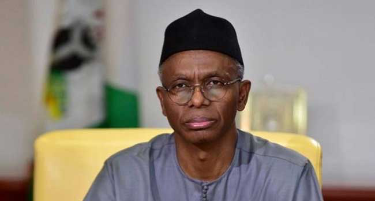Former Kaduna State Governor Nasir El-Rufai has initiated legal action against the Kaduna State House of Assembly over allegations that his administration misappropriated ₦432 billion, leaving the state with substantial debt liabilities. The suit, which was filed at the Federal High Court in Kaduna on Wednesday, challenges the Assembly’s claims and seeks to protect El-Rufai’s fundamental rights.
El-Rufai’s legal team, led by Abdulhakeem Mustapha, a Senior Advocate of Nigeria, has submitted a fundamental rights suit against the Kaduna State House of Assembly. The former governor contests the findings of the Assembly’s committee, which accused his administration of corruption and financial mismanagement during his eight-year tenure. The suit names the Kaduna State House of Assembly and the State Attorney General and Commissioner of Justice as respondents.
In the lawsuit, El-Rufai argues that the Assembly’s report is flawed and should be declared null and void. He claims that he was not afforded a fair hearing during the committee’s investigation and that the allegations were made without giving him an opportunity to respond or defend himself. This lack of due process, El-Rufai contends, violates his fundamental rights and undermines the credibility of the Assembly’s findings.

The Kaduna State House of Assembly’s report, which has sparked significant controversy, indicts El-Rufai and several senior members of his cabinet. It alleges that they misappropriated ₦432 billion through dubious loans and contracts. The Assembly’s probe into the financial dealings of the El-Rufai administration has drawn attention due to the substantial amount involved and the serious nature of the accusations.
According to the Assembly, the misappropriated funds were meant for various developmental projects and loans, which instead left the state with heavy debt burdens. The committee’s findings have cast a shadow over El-Rufai’s legacy, prompting his decision to seek legal redress.
El-Rufai’s suit underscores the critical issue of fair hearing and due process in investigative proceedings. By challenging the Assembly’s report, El-Rufai is not only defending his administration’s record but also raising important questions about the procedural fairness of the Assembly’s investigation.
This legal battle is likely to be closely watched, given El-Rufai’s prominent political profile and the serious implications of the allegations. The outcome of the case could have significant repercussions for both El-Rufai and the Kaduna State House of Assembly, potentially affecting public perceptions and future governance in the state.
El-Rufai’s administration, which spanned from 2015 to 2023, was marked by various developmental initiatives and reforms. However, the recent allegations have put his tenure under intense scrutiny, with critics and supporters eagerly awaiting the court’s decision. The case highlights the ongoing challenges of transparency and accountability in Nigerian politics, as well as the importance of upholding the rule of law and ensuring that all individuals are treated fairly in judicial and investigative processes.
As the court proceedings begin, El-Rufai’s legal team will likely argue that the Assembly’s probe was politically motivated and lacked the necessary procedural safeguards to ensure a just and impartial investigation. The respondents, on the other hand, will need to substantiate their claims and demonstrate that their findings were based on credible evidence and conducted in accordance with legal standards.
The unfolding legal drama promises to be a significant chapter in the political narrative of Kaduna State, reflecting broader themes of governance, accountability, and the protection of individual rights in Nigeria.




